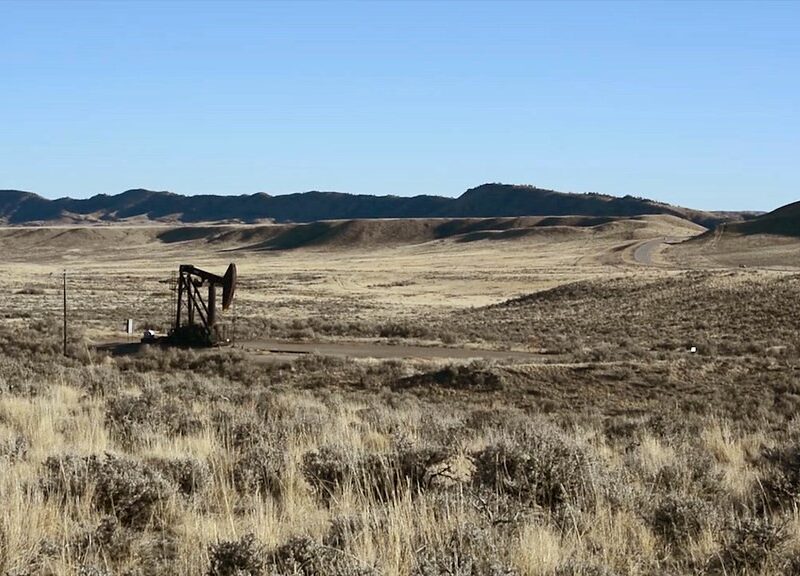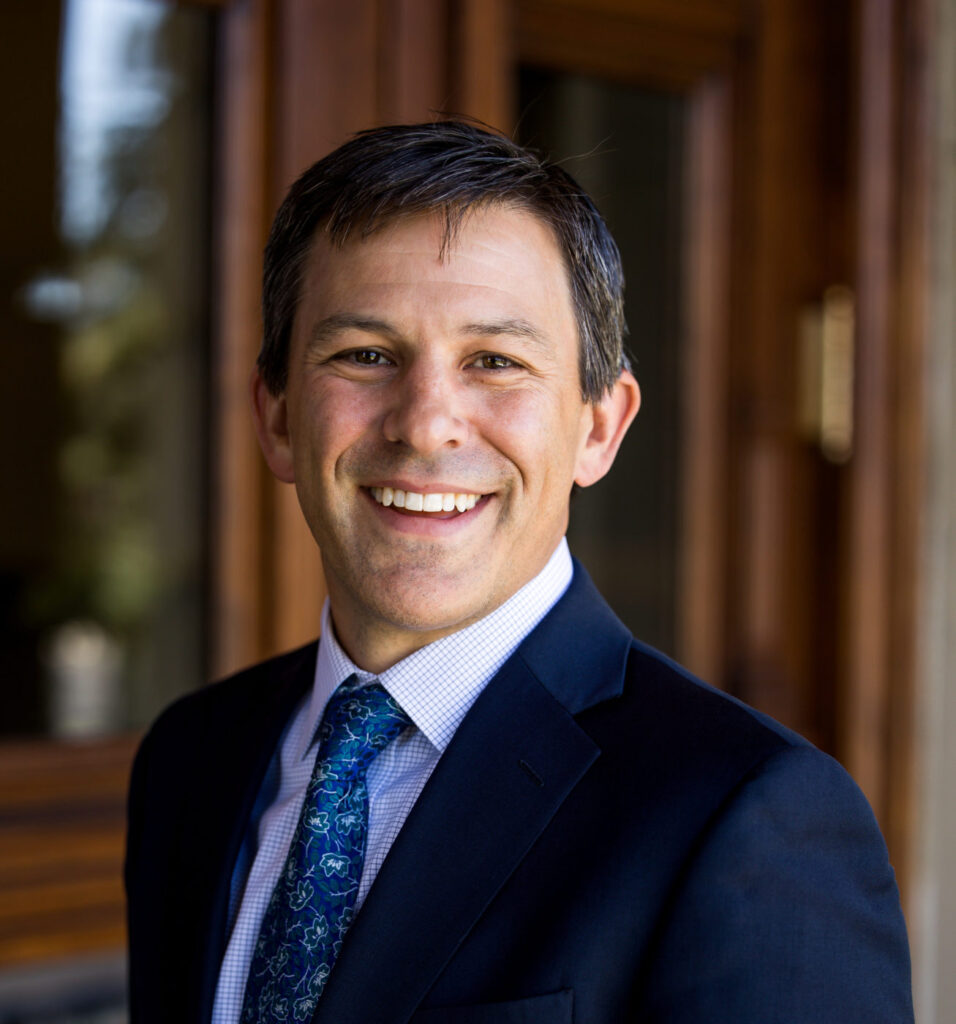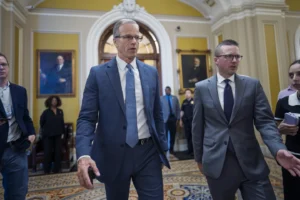State Lawmakers, Treasurer Consider Ways to Push Back Against ESG
State may revise its investment policies as soon as next month
- Published In: Politics
- Last Updated: Jul 13, 2023

Wyoming’s oil and gas industry has been impacted by recent ESG investing policies that are aimed at reducing and eventually eliminating greenhouse gas emissions. State officials are considering ways to push back against ESG. (Courtesy photo from BLM Wyoming)

By CJ Baker
Special to the Wyoming Truth
Lawmakers, the state treasurer and industry groups seem to broadly agree that the State of Wyoming should do something to protect its oil and gas industry from activist investors. But at Tuesday’s meeting of the Legislature’s Joint Appropriations Committee, there was little agreement on how to do it.
Alongside their counterparts in other Republican legislatures, Wyoming lawmakers have been debating “ESG” since last winter’s session. It’s an idea that, rather than simply looking at a company’s bottom line, investors and consumers should also consider environmental, social and governance issues. ESG has most prominently been used to promote a transition away from fossil fuels and toward zero carbon emissions.
For those concerned about climate change, the approach is a positive step forward, but to critics, ESG is “woke capitalism” that’s needlessly damaging the oil, natural gas and coal industries — all bulwarks of Wyoming’s economy.
The Legislature considered a pair of bills during its winter session that were intended to “Stop ESG.” One would have effectively prohibited state and local governments from hiring companies that follow ESG principles or are boycotting the fossil fuel, timber, mining, agriculture or firearms industries. Another would have barred the managers of the state’s $25 billion worth of investments from taking an ESG approach.
Both pieces of legislation cleared the Senate but were completely rewritten and then downvoted by the House Appropriations Committee.

Committee Chair Rep. Bob Nicholas (R-Cheyenne) said Tuesday that he supports the state’s industries, but that the original bills would have done more harm than good, noting how many companies have committed to reducing carbon emissions. He questioned the wisdom of the state becoming the ESG “gestapo” or divesting from the ESG-friendly investment giant BlackRock, one of the state’s best-performing asset managers.
Refusing to work with the companies that are targeting zero emission is “counterproductive to getting anything done,” Nicholas said. “It’s not going to save us money; it’s going to lose us money. And the idea that we don’t see the writing on the wall and make the best out of it, to me, doesn’t make sense.”
However, the committee’s February move to abruptly rewrite and scrap the bills drew the ire of their supporters, including the Wyoming Freedom Caucus. Since the session, Sen. Tim Salazar (R-Riverton) said his constituents have been “loud and clear” in voicing anger over the ESG issue.
“I think the difficulty is coming up with the language that protects not only the investments that we have, but at the same time, the will of the people of Wyoming,” Salazar said.
Revising a policy
While agreeing with the aim of the bills, State Treasurer Curt Meier also opposed the specifics. For instance, the original version of Senate File 172 said investment managers who used ESG would have to pay back three times their compensation — a “poison pill” that would have made it all but impossible to hire people, Meier said.
ESG seems to be a topic “everyone wants to opine on,” the treasurer said, but he wants to distinguish between what’s “good fodder for an editorial or a headline and what … we should actually put in an investment policy statement.”

Meier believes the issue is best addressed not by legislation but by modifying the state’s investment policy, which is set by the State Loan and Investment Board (SLIB). The board can act more quickly than the Legislature, which he said is important given the evolving nature of ESG.
Meier has proposed revising the policy to say those managing the state’s investments must make decisions based on what will yield “the highest total return on a risk adjusted basis,” and not “the furtherance of environmental, social, governance, political or ideological interests.”
If an investment partner acts in a “non-pecuniary manner,” the draft says the state will share its concerns and begin a process that could culminate in dropping the firm.
The draft adds that the state “shall prefer vendors that do not adhere to the implementation of foreign treaties or policies which are not ratified by the U.S. Congress,” which drew some questions from lawmakers.
Meier said the intent was to refer specifically to the Paris Climate Accords and the United Nations’ call for carbon neutrality by 2050. But after lawmakers wondered whether the language would also punish managers who, say, comply with federal sanctions on Russia, the treasurer indicated he’d tweak the proposal.
Meanwhile, Rep. Tom Walters (R-Casper) criticized portions he saw as personal opinions about the potential negative impacts of ESG. Meier agreed, but said he was trying to craft a policy that would clear the “political” SLIB.
The next steps
There was disagreement about whether the revised policy will settle the issue or whether the Legislature needs to take action.
Nephi Cole of the National Shooting Sports Foundation didn’t weigh in on the state’s investments, but he specifically asked lawmakers to require businesses to disclose whether they’re discriminating against certain industries.
Petroleum Association of Wyoming President Peter Obermueller said his industry’s concerns can perhaps be addressed by the state’s investment policy. Still, he expressed some frustration, contending that concerns with last session’s ESG legislation could have been addressed via amendments.
“Partly why I’m vexed is because I’ve spent half-a-year trying to communicate what would be helpful to us, and it gets lost in the sound and fury of the broader discussion on ESG,” Obermueller said.

In a presentation to the committee, he outlined the scope of the issue, including how many oil and gas companies have adopted ESG policies in the face of investor pressure. One slide noted state treasurers and public retirement systems in California, Illinois, Maryland, Oregon and New Jersey are among those who’ve joined Climate Action 100+ in calling for net zero greenhouse gas emissions by 2050. Managers commanding about one-third of Wyoming’s assets are signatories, Obermueller added. Similarly, when three climate-oriented activists were elected to Exxon’s board, “some of our managers voted for that,” he said.
While the state can revise its own laws and policies, Meier said Wyoming will need to join with like-minded states, such as those in the State Financial Officers Foundation.
“We can’t do it by ourselves. We can scream about it, we can pontificate about it, but what we can [really] do is we can work with these 27 other states in areas where we can make a difference. And we can move the needle, we can,” he said. “But make no doubt about it: We are a minority in this situation.”
Those 27 states hold about $4.5 trillion in assets, while Obermueller said the more than 700 investors on the Climate Action 100+ command $68 trillion.
Lawmakers didn’t take any action Tuesday. Nicholas suggested reviving the controversial rewrite of the ESG investment bill that the House Appropriation Committee drafted last winter, but committee co-chair Sen. Tara Nethercott (R-Cheyenne) threw cold water on the idea. While the House committee supported the substitute bill, “unfortunately, nobody else did, including the treasurer,” Nethercott said.
She was among the lawmakers to call for a cautious approach, citing the potential for unintended consequences amid a complex issue.
“We have to be smarter and thoughtful before we wreck our own future with emotionalism,” Nethercott said.
Committee members indicated they’ll revisit the topic after seeing what revisions SLIB makes to the state’s investment policies.













